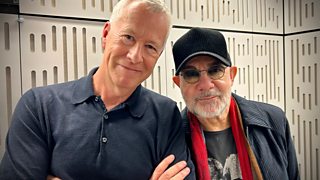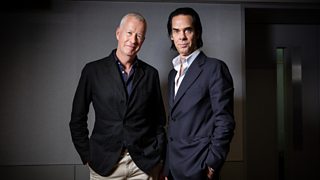Bernie Taupin: Nine things we learned from his This Cultural Life interview
As Elton John’s writing partner, Bernie Taupin has been responsible for some of the biggest pop hits in music history. The partnership, which began in 1967, has produced songs like Tiny Dancer, Your Song and Candle In The Wind. He’s won an Oscar, been awarded a CBE, and been inducted into the Rock and Roll Hall of Fame. In this episode of This Cultural Life, Taupin tells John Wilson all about his 50+ years of working with Elton John and reveals the secrets behind some of their most famous songs. Here are nine things we learned.

1. Bernie doesn鈥檛 consider himself a songwriter
Taupin was born in 1950 in Lincolnshire. He says his first interest was storytelling, not music. “That’s what I love,” he says. “I’ve always been uncomfortable with the term songwriter, because I think I’m only part of a song-writing team. Even lyricist is a little too pompous for me. When people ask how I like to be termed, it’s always ‘storyteller’.” His love of storytelling began with a passion for narrative poetry, when he was about 8 or 9. He particularly loved Thomas Babington Macaulay’s Lays of Ancient Rome, which he learned by heart and acted out in games. “It was very hard getting any friends that I made to [join in] my games because they hadn’t a clue what I was talking about!”
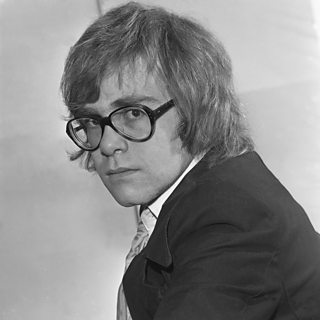
He was sort of chunky. He had Buddy Holly glasses on. He wasn鈥檛 cool, and neither was I.Bernie Taupin on first meeting a young Elton John
2. He liked Elton John because he wasn’t cool
His fateful meeting with Elton John, then Reg Dwight, came after they both responded to an advert in NME in 1967. A record company was looking for new talent. “I had no idea how to write songs,” Taupin says. “I didn’t know what the construction of a lyric meant.” His attempts were enough to get Ray Williams, the record producer who placed the ad, to pair him with John. “He’d done an audition but didn’t have any songs to sing… but Ray saw something in him and gave him my envelope of lyrics.” John took the lyrics and wrote music to them, then a meeting was organised. He was no popstar when they met. “He was sort of chunky. He had Buddy Holly glasses on. He wasn’t cool, and neither was I. That was the initial bond.”
3. Sorry Seems to Be the Hardest Word is unique among his work with Elton John
John and Taupin have always worked in the same way, with Taupin writing lyrics, then John writing a melody to fit them. Only one song broke that rule. “The only time I can ever recall anything of that nature is the song Sorry Seems to Be the Hardest Word,” says Taupin. “I visited him one day and he was sitting at the piano – which is very unusual because he hates playing piano in the house – and he just had this idea of an opening section… He just played this riff and it just came into my head, sorry seems to be the hardest word. That’s about as much as happened at that particular point. I then went away and changed the lyric.”
4. I’m Still Standing was about Bernie's ex-girlfriend
Taupin says he based many songs on either his own life or John’s. “I like to figure out what his point of view is on certain things,” says Taupin. Sometimes songs start out about one of them, then transform. “I’m Still Standing was originally written as a kiss-off to a former girlfriend, but everyone thinks of it as being about Elton’s return to form after being in rehab. I would like to think that’s the way it should be thought of, because history changes. The kiss-off is no longer a kiss-off. The person that was written about is now a very good friend of mine. She got a very good song out of it. But I much prefer to think Elton’s singing about himself.”
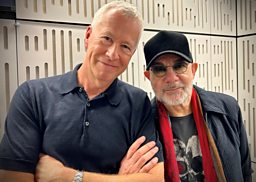
5. He's never wanted the limelight
Although he’s been 50% responsible for Elton John’s hits, Taupin has never been particularly famous, in the recognisable sense. That’s fine by him. When John Wilson asks if he’s ever resented not having the limelight, he says, “Not at all. Absolutely not. He always gave me full credit on everything.” As he says in an archival clip that Wilson plays, “I just want to write what I want to write and for it to be appreciated. If it’s appreciated then people don’t have to know me. As long as they know my writing.” He’s had times when he’s been entirely out of the limelight, not working with John for several years in the 1970s, but they’ve always remained close. “We obviously had very different ways of life,” he says, “but we never lost our communicative ability to love and work together.”
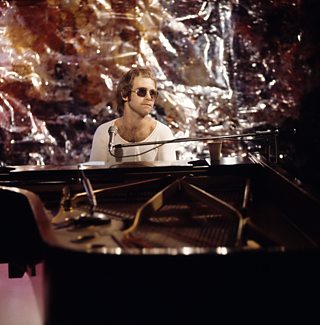
6. He was never a fan of Marilyn Monroe
Candle In The Wind is one of Elton John’s best loved records, a moving tribute to Marilyn Monroe. Taupin confesses it was not written out of any deep attachment to Monroe. He took the name from a book by Alexander Solzhenitsyn. “I just thought the title was fantastic,” he says. “It’s a great metaphor for a life snuffed out young.” He happened to be watching the film The Misfits, starring Montgomery Clift and Marilyn Monroe, both of whom died young. He thought he’d found the right subject. “My original idea was [to write about] Montgomery Clift – his character appealed to me because he was a cowboy. I didn’t like Marilyn Monroe’s character because she kind of whinged and whined the whole movie… but a lot of our fanbase wouldn’t know who Montgomery Clift was, so I did a complete turnaround and thought, ‘Maybe Marilyn Monroe’s a good idea.’” In the years since, people have assumed he’s a huge fan and bought him no end of Monroe memorabilia. Elton John even bought him a dress form that was used in the making of the famous gown she wore to sing Happy Birthday to President John F. Kennedy. “I had so much stuff, to the point where I convinced myself I was a fan and started buying stuff myself!”
7. He doesn’t remember the words to the Diana version of Candle In The Wind
Candle In The Wind was rewritten in tribute to Princess Diana, following her death in 1997. “I did that completely because Elton asked me to do it,” says Taupin. “I never met her. I never knew her. I saw her as a vulnerable character, obviously, but Elton was very close to her and it was a tragedy. We talked about writing an original song, but I don’t think time allowed.” He doesn’t remember who suggested rewriting Candle In The Wind, but he says it was a brief task and not one he remembers well. “I think I probably did it in half an hour, an hour… I don’t remember one word of it.”

8. Sacrifice is his favourite song
Taupin says his memory of his own work is generally quite poor. He was once watching the quiz show Jeopardy and there was a round about Elton John lyrics – he only got half of them right. But asked which songs are most special to him, he mentions Sacrifice. “I really love that song. I think of it as the book end to Your Song… It’s that guy probably 30 years later, who’s been through the wringer and sees all of those things you see in Your Song from a different point of view.”
It just means he鈥檚 not going to tour anymore... We鈥檝e got plans to go in the studio pretty soon.Bernie on Elton's musical future
9. Him and Elton John are still making music
Elton John announced his retirement from performing this year, with a Glastonbury headlining slot as his big farewell. Taupin says that doesn’t mean their partnership is over. “I categorically and emphatically want people to know it just means he’s not going to tour anymore,” he says. “It doesn’t mean he won’t ever play again. What he’s not going to do is go on the road and get on that hamster wheel of travelling around the world. We haven’t retired from recording. We’ve got plans to go in the studio pretty soon. I’ve been working on material.”
More from 大象传媒 Radio 4
-
![]()
This Cultural Life: Bernie Taupin
Bernie Taupin, lyricist and songwriting partner of Elton John, on his formative influences and inspirations.
-
![]()
Desert Island Discs: Elton John
Michael Parkinson's castaway is singer Elton John.
-
![]()
Goldie: Nine things we learned from his This Cultural Life interview
The musician talks childhood abuse, cultural influences and the origin of his name.
-
![]()
Nick Cave: Nine things we learned from his This Cultural Life interview
The musician discusses his love of Dame Edna Everage and processing tragedy through music.

